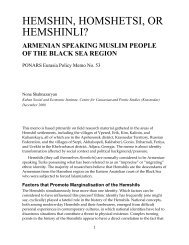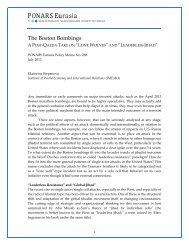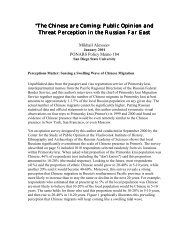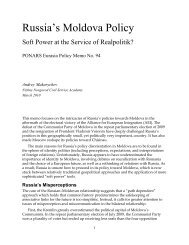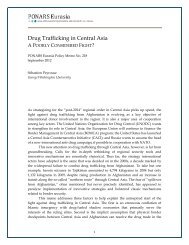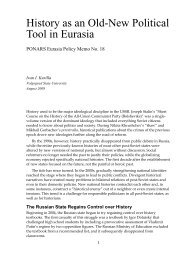Ukraine, Russia, and US Policy
Ukraine, Russia, and US Policy
Ukraine, Russia, and US Policy
You also want an ePaper? Increase the reach of your titles
YUMPU automatically turns print PDFs into web optimized ePapers that Google loves.
Program on New Approaches to <strong>Russia</strong>n Security<br />
Kramer<br />
In addition, Sergeyev reached agreement in principle on the establishment of a joint naval<br />
search-<strong>and</strong>-rescue unit <strong>and</strong> on the creation of a joint naval policing <strong>and</strong> navigation force<br />
for harbors around the Black Sea. Although American officials have claimed that the<br />
<strong>Russia</strong>n-Ukrainian harbor police force, once established, will have "no authority to allow<br />
or prohibit [Western] ships from entering harbors," some <strong>Russia</strong>n <strong>and</strong> Ukrainian officials<br />
have suggested otherwise.<br />
Sergeyev's visit also paved the way for a large array of joint <strong>Russia</strong>n-Ukrainian efforts to<br />
produce military technology. These efforts include some of the latest weapons deployed<br />
by the two countries as well as hardware produced for export. (Both countries have been<br />
eager to sell more weapons abroad for hard currency.) The agreement specifically<br />
provides for cooperation in missile technology <strong>and</strong> the production of space-launch<br />
vehicles. It also covers strategic air defense systems, tanks, multiple rocket launchers,<br />
radars, frigates, cruisers, destroyers, <strong>and</strong> military transport aircraft, including the An-70.<br />
The importance of the agreements was underscored by the new Ukrainian foreign<br />
minister, Anatoly Zlenko, in an interview shortly after Sergeyev's visit: "For a certain<br />
period of time, our relations with <strong>Russia</strong> were not normal. Now our relations are being<br />
normalized. So, it may seem that we are sharply strengthening the eastern vector of our<br />
foreign policy." Zlenko's predecessor, Borys Tarasyuk, had incurred <strong>Russia</strong>'s displeasure<br />
because of his staunchly pro-NATO leanings. Under pressure from Moscow, Kuchma<br />
had agreed in the fall of 2000 to bring in Zlenko, who promptly set about revising<br />
<strong>Ukraine</strong>'s external policies. His comments about the new bilateral agreements were<br />
echoed by a high-ranking official in the <strong>Russia</strong>n defense ministry, General Leonid<br />
Ivashov, who emphasized that the two countries could now "jointly parry foreign<br />
threats." Marshal Sergeyev himself also played up the anti-NATO thrust of the<br />
agreements, arguing that "<strong>Russia</strong> objects to NATO's eastward expansion…The danger is<br />
coming from the south, but NATO is exp<strong>and</strong>ing eastward. That is what worries <strong>Russia</strong>."<br />
A month after Sergeyev's visit, Putin himself traveled to <strong>Ukraine</strong> for high-level<br />
consultations, including a summit meeting with Kuchma in Dnipropetrovsk. The two<br />
presidents signed numerous agreements, including one providing for further aerospace<br />
cooperation (in production of satellite boosters, etc.) <strong>and</strong> another authorizing United<br />
Energy System (UES), the giant <strong>Russia</strong>n electricity company, to reunify the <strong>Russia</strong>n <strong>and</strong><br />
Ukrainian electricity grids <strong>and</strong> reintegrate the two countries' energy markets. Another<br />
agreement enabled <strong>Russia</strong>n companies to take part in the destruction of ICBMs left on<br />
Ukrainian territory, as m<strong>and</strong>ated by the Strategic Arms Reduction Treaties. The United<br />
States has been paying for the dismantling of these delivery vehicles through the<br />
Cooperative Threat Reduction program, which provides a tempting stream of revenue.<br />
Although most of the agreements signed by Putin <strong>and</strong> Kuchma were important mainly for<br />
their symbolism rather than their substance, the meeting dramatically conveyed the new,<br />
much closer relationship that <strong>Russia</strong> has now forged with <strong>Ukraine</strong>. Although Ukrainian<br />
leaders would not necessarily agree with Putin's assertion that <strong>Ukraine</strong> is in <strong>Russia</strong>'s<br />
"sphere of influence," they undoubtedly would concur with Ivashov's judgment that<br />
4



